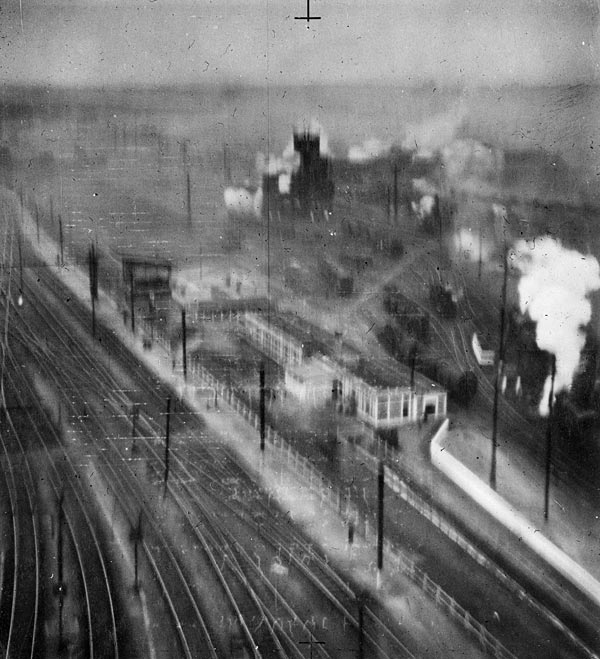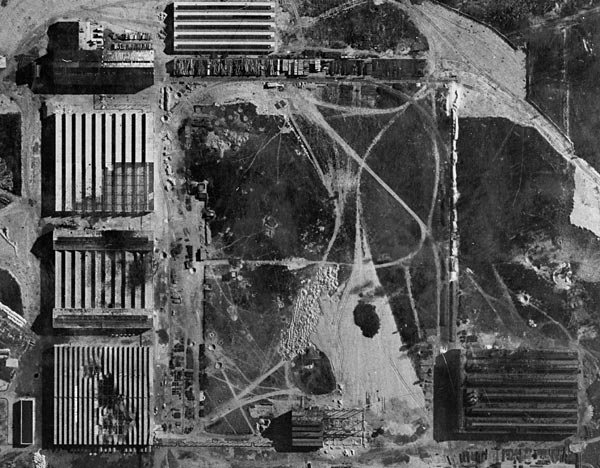Air Operations, Aleutians
6 28th Composite Bomb Group B-24s, 10 B-25s, 12 XI Fighter Command P-38s, and 4 P-40s are sent to attack Kiska, but 6 B-25s and the 4 P-40s abort due to bad weather.
[Air Operations, CBI
BURMA- 51st Fighter Group P-40s attack a bridge and the town area at Mogaung.
Air Operations, Europe
BOMBER COMMANDDaylight Ops:
- 15 Mosquitos attack the Renault works at Le Mans with several direct hits.
- 1 Mosquito is lost.
|
|
- 264 aircraft are sent on a raid to Munich. In the total are 142 Lancasters, 81 Halifaxes and 41 Stirlings.
- The wind causes the bombs to be concentrated in the western half of the city rather than in the center. There is a lot of damage, however, including the aero-engine assembly shop of the BMW factory which is put out of action for 6 weeks. 141 small, back-street-type workshops are also destroyed in the raid and damage is reported at the Nymphenburg Castle.
- 5 Lancasters, 2 Halifaxes and 1 Stirling are lost.
Air Operations, New Guinea
In an effort to mount a major air offensive against Allied bases and positions, an estimated 26 Japanese bombers escorted by an estimated 32 fighters attack Wau Airdrome and nearby Australian Army ground forces.
[Air Operations, Solomons
3 XIII Bomber Command B-24s mount individual attacks against the Ballale airfield, the Kahili airfield on Bougainville, and the Munda Point airfield on New Georgia.
[Battle of the Atlantic
- U-409 torpedoes the US freighter Malantic (3837t) in Convoy SC-121. The is abandoned in a gale losing 19 crewmen, 5 Armed Guard sailors and the lone passenger trying to reach the British rescue vessel Melrose Abbey.
- U-510 attacks Convoy BT-6 torpedoing the US freighters George G. Meade (7176t), Mark Hanna (7176t), James Smith (7181t), Thomas Ruffin (7191t), and James K. Polk (7177t). George G. Meade suffers no casualties and returns to service. Mark Hanna is abandoned by most of the crew who are rescues by the submarine chaser PC-592. Some of the crew remain on board to prepare the ship to be towed. She will be repaired and return to active service. A similar result for James Smith, althogh she loses 6 crewmen and 5 Armed Guard sailors in the initial explosion. She is towed to Trinidad for repairs after which she returns to active service. Thomas Ruffin is partially abandoned losing 4 crewmen and 2 of the Armed Guard. The survivors are rescued by the gunboat Courage (PG-70) and PC-592. She will be written off as a total loss. James K. Polk loses 1 Armed Guard sailor in the attack. She is also partially abandoned and towed for repairs. She will be eventually written off as a total loss.
- The US freighter Puerto Rican (6076t), straggling from Convoy RA-53, is torpedoed and sunk by U-586. There is only 1 survivor of the 40-man crew and hte 25-man Armed Guard complement.
CBI
BURMAColumns of the Indian 77th Brigade (Chindits) begin crossing the Irrawaddy River in order to harass the enemy farther east.
[Eastern Front
Hausser's SS troops begin to attack Kharkov from the west and north. South of the city the small town of Taranovka is strongly held by the Soviet 25th Guards Div despite vicious attacks by LXVIII Pzr Corps. The Russians contain the pressure by these armored units of von Manstein and continue to advance on Smolensk in the central sector. The Russians withdraw from Krasnodar in the Donets Basin and Barvenkovo.
SOUTHERN SECTORThe Grossdeutschland Division attacks toward Bogodukhov, striking elements of the 69th Army. Soviet 40th Army deploys 3 of its divisions at Bogodukhov in an effort to counterattack and link up with the hard-pressed 3rd Tank Army. Heavy attacks by the SS Panzer Corps sever the 69th Army from the 40th, enabling its advance east to isolate Kharkov. While the XLVIII Panzer Corps fights its way along the Mzha River from Merefa to Zmiyev, SS Panzer Corps captures Lyubotin. Amid heavy fighting the Soviets attempt to reinforce the Kharkov defenses with new units. Around the city the Leibstandarte SS Adolf Hitler Division pushes west of Dergachi while Totenkopf moves north and captures Olshany, forcing back the remnants of the 3rd Tank Army.
[Indian Ocean
3 trapped German merchant ships are scuttled at Marmagao, Portuguese India by British Commandos of the Calcutta Light Horse in an SOE operation to stop the radioing of shipping movements to U-boats in the Indian Ocean. This action is not made public until 1978.
[New Guinea
There are heavy Japanese attacks on Wau as a prelude to a spell of intensive effort in the air. This is the first in a series of raids carried out on the most important strategic positions of the Allies, including Oro Bay and Milne Bay, Port Moresby, Dobodura and Porlock Harbor.
[North Africa
The reorganization of Axis forces continues. Field Marshal Kesselring's authority over ground, air and sea units in the Mediterranean theater is extended. Gen von Arnim takes command of Army Group Africa, succeeding Field Marshal Rommel, who leaves Africa. Gen Gustav von Vaerst succeeds von Arnim as commander of the 5th Panzer Army.
TUNISIAField-Marshal Rommel, called home after the Battle of Medenine, stops off in Rome for a meeting with Mussolini. He does not hide the griavity of the Axis position, but Mussolini solemnly announces: 'Tunisia must be saved at all costs . . . I agree with the Führer; we must save Tunisia.' Rommel also meets with Hitler in East Prussia but is not able to persuade either of them to withdraw from Africa. Command of the German forces in Tunisia passes to Gen Jürgen von Arnim, while overall command of the Axis troops goes to Gen Giovanni Messe.
In the US II Corps area, the 1st Div is joined in Bou Chebka by the 18th Regimental Combat Team, which reverts to it from its attachment to the 34th Div.
[Solomons
The Americans begin a series of air raids against Japanese installations at Munda in New Georgia, an important enemy base.
[Soviet Union, Home Front
The Russian people are told for the first time, in a radio broadcast, that the Soviet Union is receiving supplies from Britain and the US.
[
